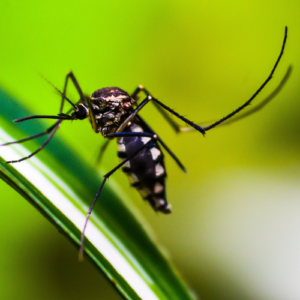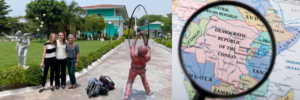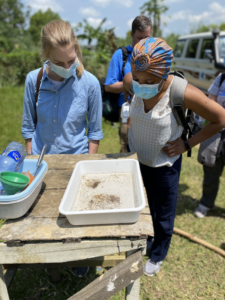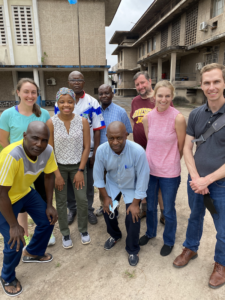
Jonathan Parr, MD, MPH, a founding member of the UNC Infectious Disease Epidemiology and Ecology Lab (IDEEL) with the Institute for Global Health & Infectious Diseases is conducting studies in Kinshasa, the capital of the Democratic Republic of the Congo (DRC), to understand the changing prevalence of drug resistance to malaria.
 Malaria remains one of the most devastating parasitic diseases for humans, especially in Africa. In 2020, 95% of malaria cases and 96% of malaria deaths were reported from this region, with 80% of malaria deaths in the region among children below 5 years of age. The World Health Organization (WHO) supports countries to help them achieve malaria elimination goals and certifies those that demonstrate malaria has been eliminated, showing the capacity to prevent the re-establishment of transmission for at least the past three consecutive years. But so far in Africa, only Algeria and Morocco have been certified malaria-free. The DRC is one of four African countries that account for just over half of all malaria deaths worldwide.
Malaria remains one of the most devastating parasitic diseases for humans, especially in Africa. In 2020, 95% of malaria cases and 96% of malaria deaths were reported from this region, with 80% of malaria deaths in the region among children below 5 years of age. The World Health Organization (WHO) supports countries to help them achieve malaria elimination goals and certifies those that demonstrate malaria has been eliminated, showing the capacity to prevent the re-establishment of transmission for at least the past three consecutive years. But so far in Africa, only Algeria and Morocco have been certified malaria-free. The DRC is one of four African countries that account for just over half of all malaria deaths worldwide.
Ruthly François, a rising star in the UNC Medical Scientist Training Program (MD-PhD), who grew up in Haiti and moved to the U.S. to become a physician researcher, is working on Parr’s team to understand drug resistance to malaria. She explains the study in the following interview, while also sharing her own research experience and professional dreams for the future.

What barriers to malaria elimination are you researching?
Drug resistance is one barrier to malaria elimination because if you want to get rid of malaria, you need to make sure that the drugs you use to treat malaria work. Drug resistance occurs when you treat someone who is sick with malaria, but they don’t get better because the malaria parasite has mutations that make the drugs not work. The idea of my work in more scientific terms is to look at genetic markers that confer resistance to antimalarial drugs over time.
Describe your specific project?

My part of this malaria project is looking at changes in drug resistance from 2014 to 2021. With our partners at the Kinshasa School of Public Health, we have followed a group of over 1,500 people since 2014, and we’ve collected blood samples since that time. Molecular studies will tell us what kind of mutations are taking place and how they are changing over time. We can also identify and study people infected with the malaria parasite species Plasmodium falciparum, the dominant species in Africa, which is the most lethal.
Among the people infected with malaria, I’m looking to see if they have mutations that may keep them from responding to treatment. We know that resistance to specific drugs is associated with specific genes; if these genes have certain mutations, the malaria parasites carrying these mutations may not respond to drugs. The idea is to find out if individuals in our studies are infected by parasites with these mutations. And if they do, how have they changed over time?
I’m doing lab work and data analysis to figure this out. New reports from nearby Rwanda and Uganda suggest the most important class of antimalarial drugs may be threatened in Africa, so this type of work is especially important.
Have you traveled to the DRC?
Right before I started medical school, I spent four months in eastern DRC working on a project with Johns Hopkins Bloomberg School of Public Health. The PI that I was working with was looking at diarrheal diseases among children, and needed a local project coordinator who spoke French.
We were trying to understand attitudes toward diarrheal disease, to identify potential interventions. Using a mix of qualitative and quantitative research, we were able to create a pilot study where we tried different interventions. When I learned about UNC’s work in the DRC, which is on the other side of the country (Kinshasa is on the west end where I’d never been) it was just a plus. Recently, I went to meet the new team I’d be working with. I like going to the places where data are collected because for me, it’s a good way to be reminded of why the work is important.
What drives your interest in medicine, infectious diseases, and malaria?
 My malaria research was serendipitous. I’ve known about malaria, but I’ve never had or worked on malaria. For medicine, I was interested because where I was growing up in Haiti, in my environment, becoming a physician has always been considered a good profession, along with engineering or law. Also, I started thinking about research more seriously because it helps make life better for people. Then, when I found myself in the lab and knew for certain that I want to do research, I experienced more of a sense of urgency. I realized that people are suffering now and research often takes a long time. It’s the idea of working on the long-term goal, but trying to mend as much as possible in the now, with medicine. That became my focus.
My malaria research was serendipitous. I’ve known about malaria, but I’ve never had or worked on malaria. For medicine, I was interested because where I was growing up in Haiti, in my environment, becoming a physician has always been considered a good profession, along with engineering or law. Also, I started thinking about research more seriously because it helps make life better for people. Then, when I found myself in the lab and knew for certain that I want to do research, I experienced more of a sense of urgency. I realized that people are suffering now and research often takes a long time. It’s the idea of working on the long-term goal, but trying to mend as much as possible in the now, with medicine. That became my focus.
When did you come to UNC?
I started the MD-PhD Program (UNC’s Medical Scientist Training Program) in July 2019. Then in Fall 2021, I started my PhD studies in epidemiology at the Gillings School of Global Public Health. Currently, I’m a second year PhD student in Epidemiology. I started working with Dr. Parr in July 2020, and then began working full time in Fall 2021. I learned about his work through the late Dr. Steve Meshnick, when I was considering opportunities to conduct research projects during my first and second year of medical school.
What are your long-term goals?
Ideally, I would like to stay in academia and practice medicine but also do research. When the political environment becomes more stabilized in Haiti, my ideal would be to have a base in the U.S. with an academic institution, and a sustainable partnership in a low or middle-income country (LMIC). Ideally Haiti because that’s where I’m from, and a lot of what I study is relevant to Haiti. But if that’s not possible, I would be happy in an LMIC where I can do long-term research in a true collaboration. I appreciate the approach that emphasizes whatever results are obtained are shared in both communities, in a true bilateral partnership. My role model is Dr. Jean William Pape. He’s affiliated with Cornell, and he is doing something similar for HIV and tuberculosis. That’s what I’d like to do.
–Kim Morris, APR
